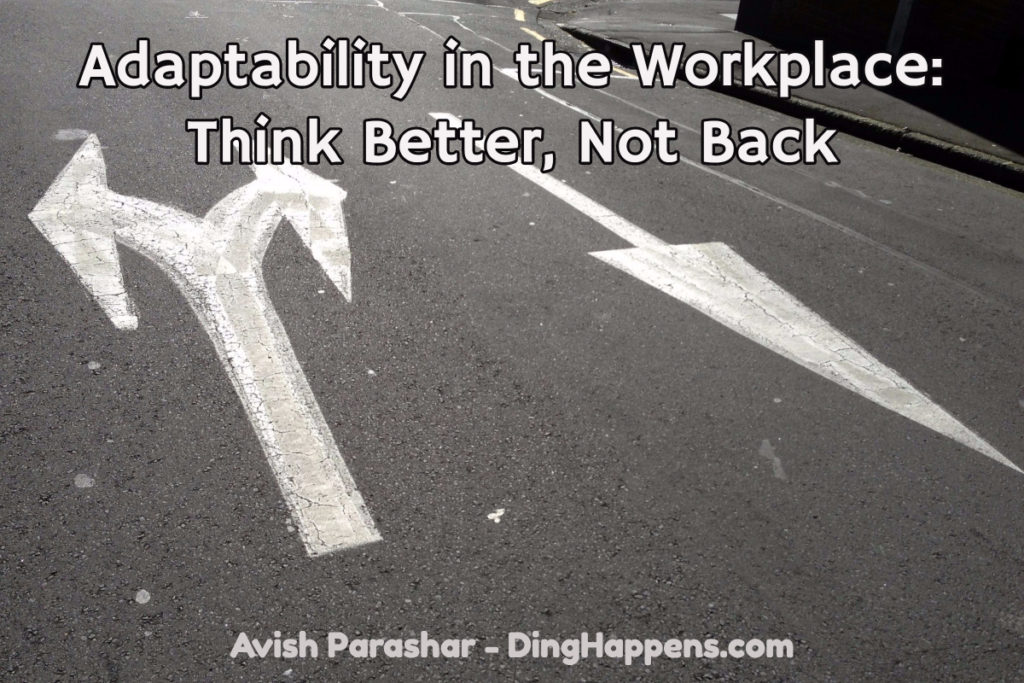Adaptability in the Workplace: Think Better, Not Back
 Adaptability in the workplace is hard for one very simple reason: change can be a giant pain in the you-know-what.
Adaptability in the workplace is hard for one very simple reason: change can be a giant pain in the you-know-what.
Just when you think you’ve got a handle on things and start to feel comfortable, DING! The situation, economy, industry, or world changes on you.
Change is inevitable. And yet, no matter how much we all know change is inevitable, so many people resist it.
For many, their first instinct when a change occurs is to think backwards. That is, their primary thought becomes, “how do I get back to where I was before the change happened?”
Unfortunately, not having adaptability in the workplace not only shuts them off from flexibility and innovation, it often keeps them stuck in less than optimal situations.
For example, years ago I bought Intuit’s Quicken software package. I was going to use this tool to revolutionize the way I managed my finances.
I have used Quicken for about 10 years now, and you know what? It has not revolutionized my finances at all.
You know why?
Because to this day, I still only use Quicken as a glorified checkbook register.
I know it has lots of options, tools, and reports, but I never use any of them.
In short, I use the new technology to keep doing things the same way I have always done them.
I fell into the trap of thinking backwards.
The Importance of Adaptability in the Workplace
Too often, organizations, businesses, and individuals operate the same way. When a change in technology, regulations, economy, or organizational structure comes along, they scramble to figure out how to keep doing business the same way they used to in this new environment.
Instead of having adaptability in the workplace, their instinct is to “go back” to where things were before. However, “going back,” may not be such a great idea for three reasons:
- The old place may not have been so great.It might not have been a happy, profitable, or satisfying place. But it’s what we know, so we try to go back.
- Going back may cut off new opportunities in the present and future. Progress is made by going forward, not back. When you dig in and resist change, you cut off innovation and progress.
- The old place may no longer exist.Companies and entire industries get wiped out by trying to hold on to a past that no longer exists. For example, when technology changes the landscape, the “good old way” of doing business may not work anymore.
Organizations and individuals who don’t have adaptability in the workplace and try to go backwards are the ones that get left behind by the ones who say, “now that things have changed, how can we do things in a better way than we did before?”
Examples of Adaptability in the Workplace
- When you lose an employee, don’t ask, “how quickly can we replace this person?” Ask, “do we need to replace this person, and if so how can we adjust both the responsibilities and the qualities we are looking for to improve the position, department, and organization?”
- When a company-wide decision forces you to adopt a new software package, don’t ask, “what do I need to know to use this software so I can get back to work?” Ask, “what features does this software have that can help me be more effective, efficient, and profitable in my job?”
- When a new law forces you to change how you do business, don’t ask, “What are the minimum changes we need to make in order to comply with the law?” Ask, “what opportunities does this new law open up for us to serve more clients or to serve existing clients better?
You won’t always come up with a game-changing brilliant answer, but by building the habit of asking the question and having adaptability in the workplace, you open yourself, your team, and your organization up to the possibility of finding and leveraging opportunity in every change that comes your way.
Remember, when Ding! Happens (and it will!) think better, not back.
And that is how you start building adaptability in your workplace.
For more information, click here to read more about adaptability in the workplace.
If your team, company, or association could use help being more adaptable in the workplace, check out Avish’s Change Management Speaker info and his Change Management Training info.












 RSS
RSS Email
Email




